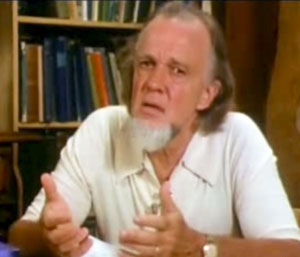 The central problem of evangelicalism and evangelism in the second half of the 20th century is the problem of the practice of principles, especially taking into account a spiritual and intellectual comprehension of that which is the dominant mentality of our century.
The central problem of evangelicalism and evangelism in the second half of the 20th century is the problem of the practice of principles, especially taking into account a spiritual and intellectual comprehension of that which is the dominant mentality of our century.
If consistent Christian principles are not practiced, "success" in evangelism can, in the flow of history, result in weakening Christianity in the next generation. Any consideration of methods and programmes is secondary to a consideration of this central problem.
The mark of our century is the victory of the Hegelian concept of synthesis, instead of a recognition of truth in the sense of antithesis and absolutes. Prior to Hegel non—Christians generally acted upon the classical concept of truth. While they had no sufficient foundation for their optimism in regard to absolutes, yet in general they acted upon the concept that if a thing was true, the opposite was false. In morals likewise, if a thought or action was viewed as right, the opposite was considered wrong. Thus if the Church in that day, including the evangelist, said that Christianity was true, or that a thing was right, this had meaning and was understood. If one said "be a good girl," for example, the statement was meaningful to those who heard it.
Since the influence of Hegel's dialectic and Kierkegaard's "leap," this is no longer the case. We are increasingly surrounded by a culture in which a concept of truth in the sense of antithesis, and of moral right and wrong, does not exist. Thus "be a good girl" is today a nonsense statement to an increasing number of 20th century people.
This concept spread in three different ways. It spread geographically from Germany, in the aftermath of Hegel. Thus, continental Europe felt its force before England, and England before the United States, and the United States before the so—called missionary countries. Secondly, it spread academically through the different disciplines. It was expressed first in philosophy, and later in art, music, and so on, including theology, down through the general culture. Thirdly, it spread socially by classes. Intellectuals and creative people were the first to think in this way. Through the arts and later the common media they then carried this concept of relativistic thinking to the masses. What remains today is what we may call (for want of a better term) the middle—class people of a certain age group. As the children of these people are educated a step away from their parents, however, a gap opens between parent and child which is greater than the gap between the parent and the Renaissance man or even between the parent and the Greek. This follows because the present gap is total inasmuch as it rests upon a completely different concept of truth. The process which brings about this change is not only formal education by educators who think in relativistic terms, but also by the art forms — the novel, the play poetry, the serious cinema and television, far—out jazz. These things today educate men in this direction in an almost monolithic voice.
By contrast historic Christianity rests upon truth - not truth as an abstract concept, nor even what the 20th century man regards as "religious truth," but objective truth. (The contrary to this is then an antithesis to the truth of what is.) Part of this truth is the emphasis that certain things happened in history. There were, for example, the manifestations at Sinai, and Christ's propositional communication to Saul in the Hebrew tongue on the Damascus road, as well as 'Christ's open tomb. Historic Christianity rests upon the truth of what today is called the "brute facts" and not just upon an unknown experience of men in past ages of which we have only a faulty hermeneutical interpretation. Behind the truth of such history is the great truth that the personal, infinite God is objectively "there." He actually exists (in contrast to His not being there); and Christ's redemptive and finished work actually took place at a point of time in real space—time history (in contrast to this not being the case). Historic Christianity rests upon the truth of these things in absolute antithesis to their not being true. This carries with it the possibility and the validity of that personal antithesis which occurs at the new birth, wherein the individual passes from death to life. To weaken the historic Christian concept of antithesis is eventually to make meaningless the personal antithesis of the new birth.
If a clear and unmistakable emphasis of truth, in the sense of antithesis, is removed, two things occur: first, Christianity in the next generation as true Christianity is weakened; and second, we will be communicating — in any real sense of communication — with only that diminishing portion of the community that still thinks in terms of the older concept of truth. We are not minimizing the work of the Holy Spirit; we would remember, however, that our responsibility is to so communicate that those who hear the Gospel will understand it. If we do not communicate clearly, then those who respond will not really understand the Christian answer clearly. If we do not communicate clearly on the basis of antithesis, they will respond to their own interpretation of the Gospel in their own relativistic thought—forms — including a concept of psychological guilt—feelings rather than of true moral guilt before the holy living God. If they respond thus they have not understood the Gospel; they are still lost, and we have defaulted in our task of preaching and of communicating the Gospel to our generation.
Thus, in the Conference's theme: "One Race, One Gospel, One Task," one might ask if perhaps the most important thing has been omitted, namely, "One Truth"
The unity of orthodox or evangelical Christianity should be centered around an emphasis on truth and not on evangelism as such. This emphasis on truth is always important, but doubly so when we are surrounded by a generation for whom the concept of truth in the sense of antithesis is not so much denied as it is considered to be totally Untenable. In such a setting the Christian with his emphasis on true truth is the real radical on both sides of the Iron Curtain, because today the unifying factor on both sides of the Iron Curtain is the general acceptance of dialectical thinking.
In such a setting the problem of communication is serious; it can only be overcome by negative statements that clearly say what we do not mean, so that the 20th century man understands our positive statements of what we do mean. Moreover, in an age of synthesis men will not take our protestations of truth seriously unless they see by our actions that we seriously practice truth and antithesis in the unity we try to establish and in the evangelism we practice. Without this, in an age of relativity, we cannot expect the evangelical, orthodox Church to mean much to the surrounding culture or even to the Church's own children, for what we try to say in our teaching and. in evangelism will be understood in the 20th century thought—form of synthesis. Both a clear comprehension of the importance of truth and a clear practice of truth even when it is costly to us to practice truth is imperative if our witness, our evangelism, and such a Congress as this are to be significant, or even useful, in our own generation and in the flow of history.
http://www2.wheaton.edu/bgc/archives/docs/Berlin66/schaeffer.htm


















